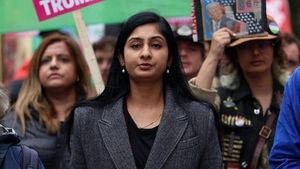On July 11, 2025, the Lee Jae-myung administration announced the appointment of two key cabinet minister candidates, marking the completion of its first round of ministerial selections. Choi Hwi-young, the co-CEO of NOL Universe and a seasoned executive in the travel and digital platform sectors, was designated as the Minister of Culture, Sports and Tourism. Meanwhile, Democratic Party lawmaker Kim Yoon-deok was named the candidate for Minister of Land, Infrastructure and Transport. These appointments were revealed by Kang Hoon-sik, Presidential Chief of Staff, during a briefing at the Yongsan Presidential Office in Seoul.
Choi Hwi-young’s selection represents a notable shift in the profile of leaders chosen to head the Ministry of Culture, Sports and Tourism. Born in 1964 in Busan, Choi graduated from Gyeongseong High School in Seoul and later earned a degree in English Language and Literature from Sogang University. His early career was rooted in journalism, spending about a decade working at Yonhap News and YTN before transitioning into the digital media and technology sectors.
In 2000, Choi joined Yahoo Korea’s new media team, and two years later, he moved to NHN, the parent company of Naver, where he quickly rose through the ranks. He served as head of Naver’s main office planning department and was appointed one of Naver’s three representative directors in 2005, leading the company as CEO until 2009. He then continued as CEO of NHN Business Platform until 2013. Choi is credited with playing a pivotal role in establishing news search services at Naver during its formative years, bridging his journalistic background with digital innovation.
After leaving NHN, Choi co-founded the travel platform 'Triple' in 2016 alongside Kim Yeon-jung, a former executive from Kakao. Triple is an AI-driven, personalized travel information platform that leverages big data to recommend tailored travel products such as airline tickets and hotels, revolutionizing the way users plan trips. In 2022, Triple was acquired by Yanolja and merged with Interpark, a leading player in flight and performance ticketing. Choi assumed the CEO role of the merged entity, Interpark Triple, drawing attention for his leadership in the travel tech industry.
By late 2024, Choi became co-CEO of NOL Universe, an integrated corporation formed from the merger of Yanolja, Interpark, and Triple. This conglomerate now stands as Korea’s largest travel platform, combining accommodation bookings, flight and ticket sales, and personalized travel recommendations under one umbrella. His extensive experience in online portals and travel platforms was a key factor in his nomination, with the Presidential Office highlighting his “market-centric sensibility” and ability to realize President Lee’s vision of ushering in the “K-culture market era of 300 trillion won.”
This appointment is historically significant, as Choi is the first candidate from the tourism industry to be nominated as Minister of Culture, Sports and Tourism since the ministry’s renaming in 2008. Traditionally, ministers have hailed from cultural or sports backgrounds, but Choi’s business-oriented profile signals a strategic pivot toward viewing culture through an industrial and content-driven lens. The tourism sector, buoyed by expectations to revive foreign visitor numbers to pre-pandemic levels, anticipates this change positively, hoping it will accelerate growth and innovation.
According to the Korea Tourism Organization, foreign tourist arrivals last year reached 16.96 million, slightly below the 17.5 million recorded before COVID-19. Moreover, about 80% of tourists concentrate in the Seoul metropolitan area, underscoring the need for balanced regional development within the tourism industry. The appointment of Choi is also expected to expedite the filling of the long-vacant Korea Tourism Organization president position, which has been open for 18 months since the previous president resigned to run for public office.
However, not all responses to Choi’s nomination have been positive. Cultural Solidarity, a civic group focused on cultural affairs, expressed reservations. They noted that the Ministry of Culture, Sports and Tourism oversees a broad portfolio, including culture, arts, content, sports, tourism, media, and public relations. The group questioned whether Choi’s expertise, largely rooted in tourism and travel tech, would translate effectively to the ministry’s cultural and artistic domains. They described the appointment as “difficult to accept,” citing concerns about whether he could balance the ministry’s public-oriented cultural responsibilities with its industrial content and tourism sectors, and whether he could lead integrated cultural policy suitable for a new era.
Meanwhile, Kim Yoon-deok, the candidate for Minister of Land, Infrastructure and Transport, brings a legislative and policy background to the cabinet. As a member of the National Assembly’s Land, Infrastructure and Transport Committee, Kim has demonstrated significant expertise in addressing real estate and infrastructure issues. Kang Hoon-sik praised Kim’s ability to approach housing and land problems from the perspective of ordinary citizens rather than as a bureaucrat or academic, emphasizing his commitment to balanced regional development and practical governance.
Kang highlighted Kim’s alignment with President Lee’s philosophy of not tolerating real estate speculation that destabilizes housing markets while respecting market principles and protecting genuine homeowners. The expectation is that Kim will provide visionary leadership across land, construction, transportation, and mobility sectors, contributing to the government’s broader goals of economic stabilization and social equity.
The appointments of Choi and Kim also reflect a broader trend within the Lee administration to incorporate private sector entrepreneurs and experienced professionals, particularly those with ties to Naver, into key government roles. This is evident in the earlier nominations of Ha Jeong-woo as AI Future Planning Chief and Han Seong-sook as Minister of SMEs and Startups. President Lee has urged all government departments to innovate boldly, break from old conventions, and respond swiftly to pressing challenges such as inflation, heat waves, and economic slowdown.
Choi’s career trajectory—from journalism through digital media leadership to pioneering travel tech platforms—embodies the kind of cross-sector expertise the administration values. His role in consolidating Korea’s largest travel platform and his vision for leveraging K-culture’s global appeal to expand the content industry align with national economic and cultural ambitions. Yet, the concerns raised by cultural advocates underscore the challenge of balancing commercial growth with cultural stewardship in a ministry that spans diverse and sometimes competing interests.
As Choi prepares to take on his ministerial role, all eyes will be on how effectively he can navigate these complexities, foster innovation, and harmonize the ministry’s multifaceted mission. The tourism industry’s hopes for a 20 million foreign tourist milestone and the government’s broader cultural and economic goals hinge in part on his leadership. Meanwhile, Kim Yoon-deok’s stewardship of land and infrastructure policy will be critical in addressing housing stability and regional development, key priorities for the administration.
Ultimately, these appointments signal a government eager to blend private sector dynamism with public service, aiming to transform Korea’s cultural and infrastructural landscape amid a rapidly changing global environment.




